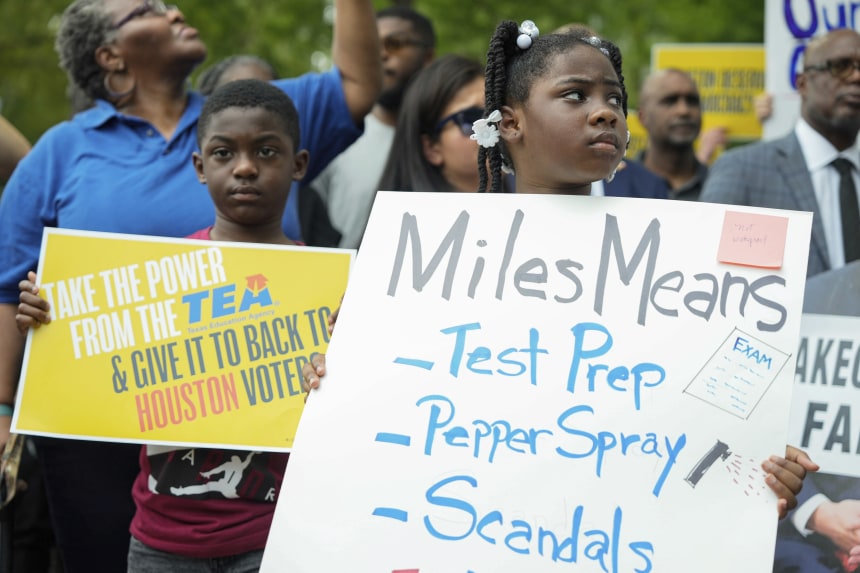Texas Reforms Impact Latino and Black Parents as School Choice Debate Rages
Children carry signs to protest the state takeover of the Houston Independent School District | Credit: nbcnews
The recent overhaul of Houston's schools by the state of Texas has stirred up a long-standing history of racism and neglect, particularly affecting Latino and Black children. Additionally, it has cast a spotlight on the state's still-inequitable public school funding system.
In a sweeping move, Texas has taken control of approximately 85 schools, with the majority serving Latino or Black communities. This intervention has led to standardized teaching methods, revamped curricula, the conversion of school libraries into discipline and study centers, and the reassignment of teachers and librarians.
The state argues that these drastic changes were necessary to rescue the schoolchildren in the district, where 62% of the students are Latino and 22% are Black. For years, many students in these communities have struggled with education, often lagging behind their peers in vital subjects like math.
However, the dismantling of resources in already underfunded Latino and Black public schools, including some that had been performing well, raises concerns reminiscent of past practices of segregation and unequal education.
"The problems that created educational inequities can’t be solved by one element," says Thomas Saenz, president and general counsel of the Mexican American Legal Defense and Educational Fund (MALDEF). He emphasizes that comprehensive attention, resources, and monitoring are needed to address these issues properly. These predominantly Black and brown districts are suffering from a lack of resources, perpetuating the cycle of inequity.
Texas, like other parts of the United States, has a history of laws that prohibited Black children from accessing education. Even Mexican American children were subjected to these discriminatory practices. They were confined to inferior "Mexican schools" with inadequate resources and limited grade levels. These schools were created under the pretense of providing English language instruction but instead became dumping grounds for children with Spanish last names, regardless of their English proficiency.
The struggle for equal education for Mexican Americans in Texas spans nearly 200 years and has involved numerous court cases, protests, walkouts, boycotts, and the establishment of their own schools. Despite these efforts, educational inequality persists, and it's not accidental; it's systemic.
The state has institutionalized segregated schools through various means, including school choice plans, gerrymandering, transfer policies, neighborhood schools, biased public infrastructure placement, and housing regulation. Additionally, the state's school finance system, which relies heavily on property wealth, contributes to this inequity, with many of the targeted schools in property-poor communities.
These systemic issues are exacerbated by accountability systems based primarily on standardized tests, which disproportionately affect students of color and those from low-income backgrounds.
The forced overhaul of Houston's public schools has been met with resistance from parents who feel their voices have been ignored. The New Education System model, imposed on these schools, has led to rigid curricula, the removal of librarians, and a system where students who excel are separated from those who struggle.
Critics argue that these changes are a direct attack on Hispanic and Black communities and create emotional trauma for students. Parents are concerned that the overhaul is dividing children based on their academic performance.
While proponents of the changes, including the state-appointed superintendent, Mike Miles, claim that they aim to correct inequities and maximize resources, many parents and advocates remain skeptical. They believe that these changes may perpetuate unequal opportunities and fail to address the root causes of educational inequity.
As Texas debates school choice and education funding, parents like Jessica Campos and Mayra Lemus feel powerless and unheard in their struggle to ensure equal education for their children. The battle for educational equality continues, highlighting the complex challenges facing these communities and the urgent need for comprehensive solutions.
I understand Ads can be very intrusive, annoying, and capable of disrupting user's reading experience. So, for this reason I do not wish to run them on my blog. If you enjoy my post and contents and wish for me to continue and keep growing, please support me.
Buy me a Coffee! 🍵




Comments
Post a Comment